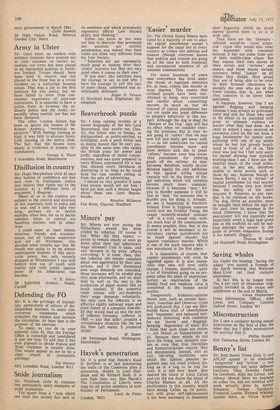'Easier murder
Sir: The United States Senate have voted by a majority of one to abolish capital punishment except I suppose for the usual bar in every country at crimes like sedition and treason (though everyone knows that sedition and treason are going on all the time by both respected and unrespected members of all national communities).
For many hundreds of years man everywhere has lived under the threat of legalised execution for, at least, crimes like murder in most degrees. This means that civilised people have been conditioned to being very controlled and careful about committing murder. So much so that the removal of capital punishment has not yet made any great difference to people's behaviour in this respect. Although the dog is dead the ' Beware of the Dog' sign still has its effect when we consider entering the premises. But in time we are going to ' notice ' that we may now kill and really get away with it — as the substitutes for capital punishment become more and more derisive and, due to penal ' reform,' become even less worse than punishment for pilfering goods off the railway. As man becomes, therefore, totally de-conditioned legally the only inhibition in him against killing almost casually will be the threat of illegal execution which will certainly become much more common; because if it becomes ' easy ' for you to murder someone it will be just as ' easy ' for someone else to murder you for doing it. Already, we see it happening in Northern Ireland. Even in England someone could now see Graham Young, the casual ' scientific-minded' poisoner ' off ' in a cold, casual way, without much fear of the consequences. It seems possible, then, that in due course it will be necessary to reintroduce capital punishment not so much against murder but against retaliatory murder. Which is one of the main reasons why it was introduced in the first place.
It is impossible, of course, that capital punishment will even be legalised again. It is also impossible that men will ever really change. I foresee, therefore, quite a lot of bloodshed going on as personal takes the place of impersonal justice; as reactivation of the deadly feud and vendetta virus is completed in the human social system.
Dangerously humanist-optimist liberal men, such as certain Spectator, Guardian and Observer types will pooh-pooh this. I can see their foolish faces (full of cheerfulness and ' happiness ' and balanced mindedness) distorting with contempt for my ' fascist ' and ' flogginghanging ' degeneracy of mind. But I think that such types are rotten — not liberal or humanitarian at all. Because their minds do not have the living, taut, dynamic realism at core that true liberalism and humanitarianism require: they are decomposed, instead, into an evil, left-wing slushiness onto which the lightest genuine argument may not tread without sinking as in a bog to be lost for ever. It is odd how much they desired the blood of Lieut Callan and yet did not desire the blood of Charles Manson at all. All the abolitionists in this country would have strung Callan up (in public, too) with great self-righteousness it not been necessary to dissemble
their hypocrisy which no doubt merely alowed them to do it in wish only.
Then there are the ' liberalist 'infected would-be 'cruel aristocrat' types who would also treat my argument with contempt because it has not come from one of their middle-class clique. But they expose their own moves in their novels and 'reviews' and essays; and these moves include summary lethal ' justice ' on all whom they dislike. How proud they are of being able to be cruel to their fictional characters especially the ones who are of the lower classes, that is, are what they conceive to be lower class specimens.
It happens, however, that I am against flogging and hanging because I was always so grievously sorry and sick for those who used to be about to be punished with great or ultimate violence no matter what they had done. As a child at school I once received an enormous clout on the ear from a huge headmaster for openly sympathising with one of my mates whom he had just grossly humiliated in front of all of us. This clout was just but I felt very sorry for myself showing how typically working-class I am. I have not the familiar touch of the cruel aristocrat in me and am, therefore, unable to write novels such as those by, say, Auberon Waugh or Simon Raven. I am in 'favour' of capital punishment for real murder because I realise (not just think) that the safety of the state requires it. Requires, at any rate, that it be replaced on the books. The dog, fierce as possible, must be brought back before the sign on the gate loses its message in the mind. Otherwise, I know that the executioner will not passively and impartially await a legal task given him at the scaffold: he will be walking amongst the people in the guise of private vengeance finding it for himself, illegally. Thomas W. Gadd 124 Hucknall Road, Nottingham










































 Previous page
Previous page